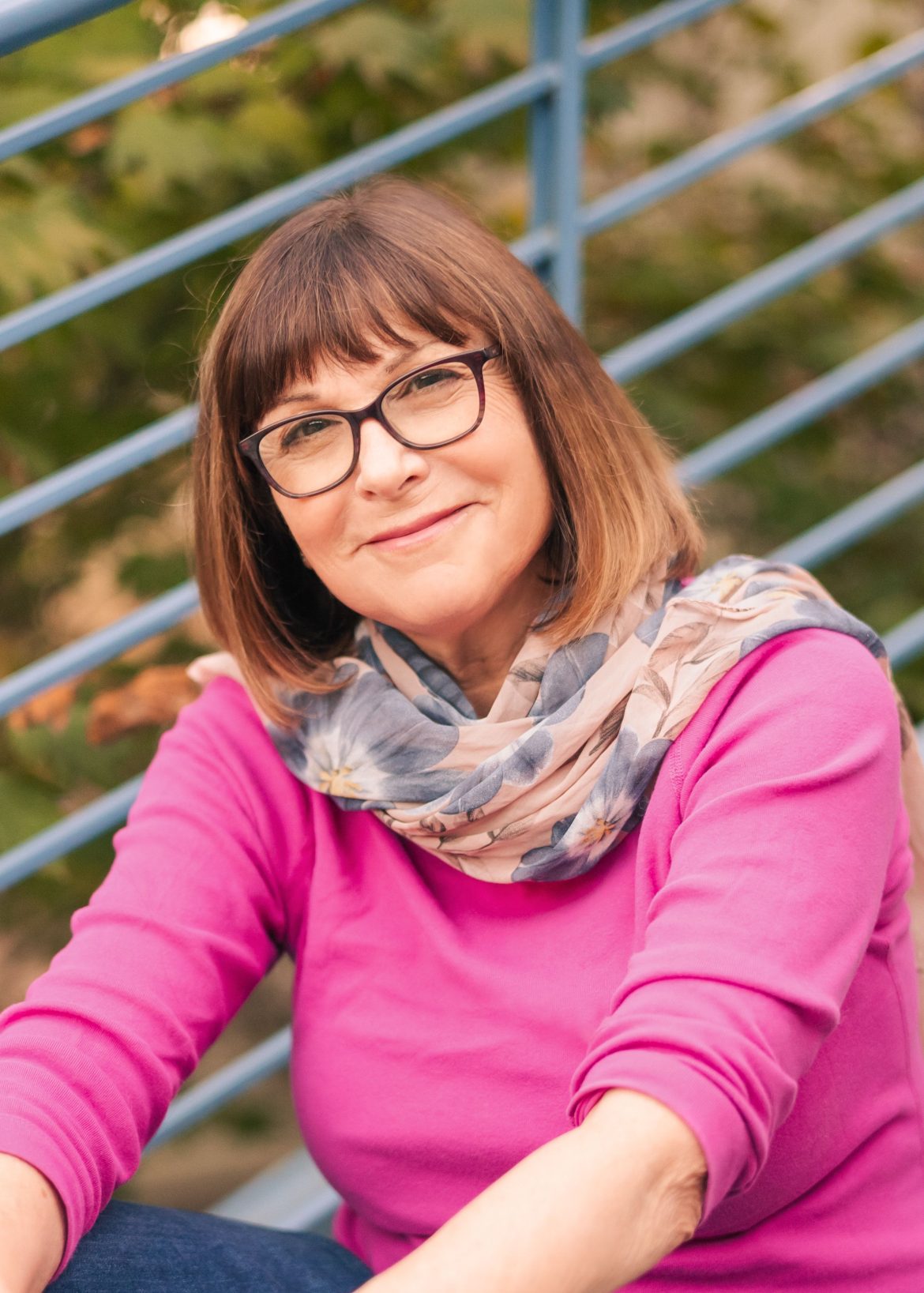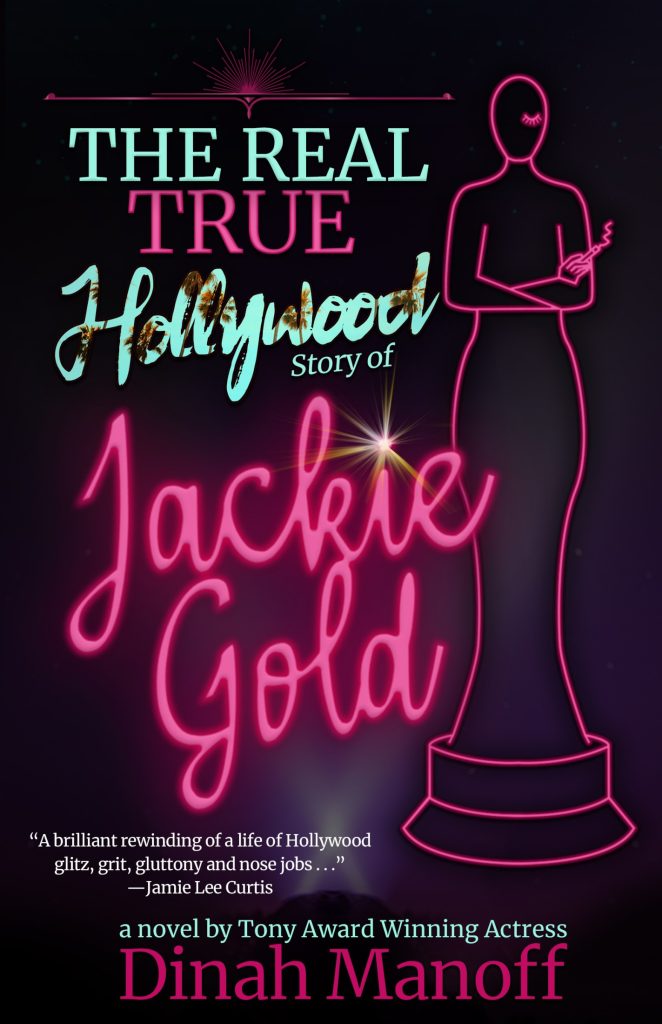FAME! That coveted phenomenon.
BUT is it all it’s cracked up to be?
We mere mortals look on in awe, wishing we could stroll down that red carpet at the Academy Awards swathed in Versace and Harry Winston jewels with cameras flashing. Be careful what you wish for. Think of all those stars caught by the tabloid press in their bathrobes and shorts.
Dinah Manoff was born into Hollywood royalty. The daughter of Academy Award winner, Lee Grant, and screenwriter, Arnold Manoff. Did she ever have the privacy to do as she pleased without paparazzi recording her every move?
“What price fame? Does that have to come with the deal of wanting to be a performer?”– Dinah Manoff,
Now in her debut novel, The Real True Hollywood Story of Jackie Gold (Star Alley Press), Manoff takes us on a sometimes hilarious romp through Hollywood while exposing the raw pain that comes with fame.
Manoff is best known for her role as Carol Weston on the seven seasons of sitcom Empty Nest, a spin-off of The Golden Girls where she made several appearances as this same character. Her film career is highlighted by her role as Pink Lady, Marty Maraschino, in the mega-hit film, Grease. She won a Tony Award for her portrayal as Libby Tucker in the Broadway production of I Ought to Be in Pictures and reprised the role in the film adaptation.
We caught up with Manoff shortly after the release of the audiobook for Jackie Gold.
Is any part of Jackie’s story autobiographical?
In some ways. Like Jackie, I had my years in Malibu Colony when I was young. I really enjoyed writing her childhood there because of references that were so evocative for me like the Colony Coffee Shop which no longer exists and the house that she grew up in I modeled on the first house that was really built like a gargantuan structure when one of the old beach shacks was knocked down. All of that was so juicy for me to go into. But biographical no, because Jackie’s life is so different from mine even though she grows up in show business like I did. Jackie’s mother is a very different person than my mother. Jackie feels like she stumbled into an acting career and that’s how I feel. We share feeling insecure and like a fraud, to the point of getting plastic surgery to pass for an ingenuine. Those things I took from my own experience.
Why did you choose to place major events in Kauai?
I did spend a great deal of time in Kauai and I was able to use some of that experience for Jackie. I can smell it and feel it. It was easy for me to bring up because it was so powerful in my life at different times. I’ve been going there since I was a teenager. I got married there.
What inspired you to write this book with the message that fame comes at such a high price?
The first seed of this book was planted when the horrible tragic accident happened with Princess Diana being followed by the paparazzi into that tunnel. Shortly after that I gave birth to my first child and a guy from the Inquirer showed up at my front door and wanted to question me about the paternity of my son. I felt so invaded, so attacked, I chased him off my property in my pajamas and called my lawyer.
Why did you use the writing style of lots of clever quips laced into dramatic scenes?
That’s what we entertainers do, we take terrible situations and make entertainment out of them. While there’s a lot of darkness in the story, hopefully there’s enough comedy and lightness to balance it out and make it a fun read. Jackie is in a coma when she tells this story. She’s lying there with the nurses trying to steal her boyfriend, people are confessing their secrets and they don’t know that she comprehends. Everybody thinks she’s gonna die any second so she’s privy to their secrets and it just gave me so much material to work with in terms of her quips.
How was it acting the role of Jackie in the audiobook?
Getting to act as Jackie and put voice to voice was so much fun. I didn’t think that was gonna be part of my journey with this book but it has come to that. Honestly, I think the audible is even better than the book.
Why did you decide to create Jackie as a flawed protagonist making some reckless decisions?
Yes, she is a flawed protagonist, but I couldn’t imagine wanting to take the journey with her otherwise. It’s a book of self-examination.
Why did you write the book in flashbacks and add movie script cues?
It evolved into a flashback book. It felt right for Jackie to use script format because of her acting in Hollywood films and growing up in show business. That was the way she saw everything, like a film.
Why did you choose to start the book with Jackie’s accident?
It originally started in the hospital then my mother read the first couple of chapters and said it needs a sexier opening, something really dazzling in the beginning. I don’t usually take my mother’s critiques, I’m still pretty rebellious. But I thought she was right. So, I rewrote that opening scene starting with the proposal. It was a sexier opening and it really set the tone of the book with the paparazzi storming in and Jackie falling from the balcony.
What did your mother say about the mother from hell that you constructed in your novel?
That woman and my mother have absolutely nothing in commonJackie’s mother was loosely based on something I heard about when I was a kid growing up in Malibu Colony. There was a waitress at the Colony Coffee Shop like Merilee is in the novel and this very wealthy guy from the colony left his wife and married her. It was the talk of the colony when I was a kid so somehow she became Jackie’s mother for me.
Did you always want to write even as a child?
I did write as a child. Writing was my first way of expressing myself. Acting which I started doing at 17-18, I did because it was my fallback position. I had to make a living, so I thought well try this and that’s how I became an actress. Much like Jackie, I stumbled into the profession because it was the only thing I knew. I had grown up cueing my mother on scripts from the time I could read, I had an innate sense of timing and structure. I had connections, much like Jackie does in the book. Getting an agent was a matter of a phone call. I was just lucky and I went to some acting classes but mostly I ditched. I was a screw up. It took me a long time to learn craft and to not be self-conscious and fearful. That was very much in my way as a young actress because I did feel like a fraud. I didn’t know what I was doing. I was just blindly showing up and saying my lines.
You say you felt like a fraud and that’s how you depict Jackie, she too feels like a fraud.
That’s where all that comes from. I think that personally writing the Hollywood stuff in the book was the most boring part for me. There isn’t anything really glamorous or new to say writing about Hollywood, but the insecurity and fear, that was an interesting place to go, to keep that at the forefront of those scenes. That made them relatable.
Did you have friends who were jealous about your success as you describe Jackie’s boyfriend, Brett, was?
I had boyfriends who just didn’t know what to do since I had a much richer career than they did and I don’t mean richer in money, I mean just more substantial. But not like Brett. He’s such a funny character. I had to work hard to make him three-dimensional and a guy that you could believe not a cliche. But I know those actors. There are so many Bretts out there.
You have worked with some amazing Hollywood actors. What would you like to say about that?
I look back over my career and I think how lucky I was to work with such extraordinary people. Getting to do Ordinary People with Robert Redford directing and incredible artists like Timothy Hutton and Walter Matthew. The ladies on The Golden Girls were larger than life. On Empty Nest, Richard Mulligan was an exceptional actor, friend, mentor and father figure for me for seven years. These were all super talented people that I had a chance to work with.


